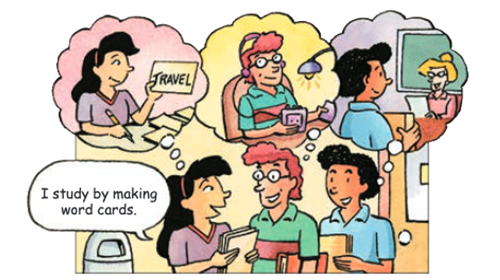九年级|U1 02 Section A 2d
Role-play the conversation
Jack: Annie, I’m a little nervous. I have to finish reading a book and give a report next Monday.
Annie: That doesn’t sound too bad.
Jack: But I’m a very slow reader.
Annie: Just read quickly to get the main ideas at first. Don’t read word by word. Read word groups.
Jack: But I don’t understand many of the words. I have to use a dictionary.
Annie: Try to guess a word’s meaning by reading the sentences before and after it. You probably understand more than you think.
Jack: That sounds difficult!
Annie: Well, be patient. It takes time. You can become better by reading something you enjoy every day. The more you read, the faster you’ll be.
参考译文
杰克:安妮,我有点紧张。我必须读完一本书,并且在下周一做一份报告。
安妮:听起来没那么糟糕呀。
杰克:但我读书特别慢。
安妮:一开始先快速读,抓住主要意思就行。别一个词一个词地读,要按词组读。
杰克:可好多单词我都不认识,我得查字典。
安妮:试着通过读这个单词前后的句子来猜它的意思。你可能比自己以为的理解得更多。
杰克:那听起来好难啊!
安妮:嗯,要有耐心,这需要时间。每天读点自己喜欢的东西,你就能变得更厉害。你读得越多,速度就会越快。
Key Words
Key Structures
Self-Test
“学习重要,复习更重要,练习最重要“
结合音频,熟练朗读文章,加深对文章的理解
培养语感,朗读是动用口、眼、耳,多维度的信息摄取,配合动脑视译,快速理解文章。
文章中标记的单词、词组,以及语法点,是否能够识别,并清晰背后知识点
1.【学习金字塔】快速口语造句,用起来;
2.【费曼学习法】将知识点讲给自己或旁人听,是否清晰明白;
造句:作为老师,她不仅对学生有耐心,还乐意课后耐心帮他们解决问题。(patient)
As a teacher, she is not only patient with her students but also patient to help them solve problems after class.
造句:志愿工作让我的生活更有意义,因为我能帮助有需要的人。(patient)
Volunteer work makes my life more meaningful because I can help people in need.
造句:如今,人们越来越关心环境保护。(more and more)
Nowadays, people are more and more concerned about environmental protection.
